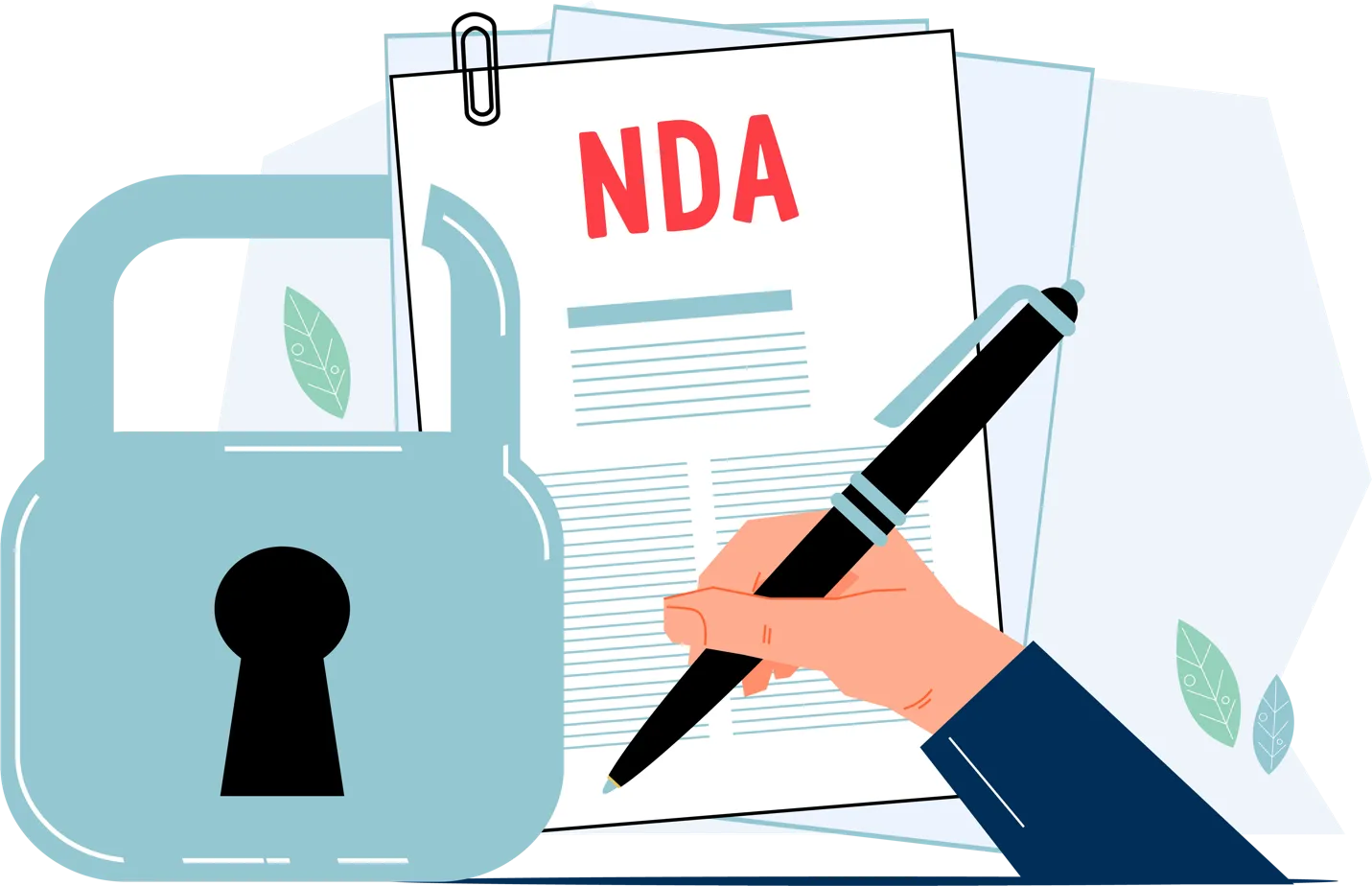Non-Compete Agreements and NDAs - Are They Really Legal?
In many industries, maintaining confidentiality, professional discretion, and minimizing competition are essential for protecting business interests.
To ensure sensitive information remains secure and to prevent competition, companies often require employees or partners to sign agreements like non-compete and non-disclosure agreements (NDAs).

However, the legality and enforceability of these two agreements vary depending on jurisdiction and circumstances, making it crucial for businesses and individuals to understand their rights and obligations.
| In this article, SME provides a clear explanation of NDAs and non-compete agreements, detailing their purposes and the circumstances under which they are legally enforceable. |
|---|
What is a Non-Disclosure Agreement (NDA)?
A Non-Disclosure Agreement (NDA) is a legal contract that ensures confidentiality between parties, preventing the sharing of specified sensitive information. Commonly used in business, NDAs protect proprietary data, trade secrets, and intellectual property from being disclosed to third parties.
In many cases, employers require employees to sign NDAs to safeguard company information during and after employment.
NDAs specify what information is confidential, who is bound by the agreement, and the consequences of breaches, thereby protecting businesses from unauthorized use or disclosure of their assets, which could lead to competitive or financial harm.
Types of NDAs :
Depending on the circumstances, an NDA can be unilateral, meaning only one party is obligated to maintain confidentiality, or bilateral, where both parties are required to keep the information private. In more complex situations, it may even be multilateral, involving multiple parties.
What Are the Essential Components Typically Included in an NDA?
The content of an NDA varies depending on its purpose and the nature of the confidential information it intends to protect. However, certain elements are common to most NDAs, ensuring clarity and enforceability:
| Component | Explanation |
|---|---|
| Identification of parties | An NDA must clearly identify all parties involved in the exchange and protection of confidential information. In a unilateral NDA, the parties consist of the disclosing party (who shares the information) and the receiving party (who is obligated to maintain confidentiality). In bilateral and multilateral NDAs, all parties have shared responsibilities for both disclosing and safeguarding the confidential information. |
| Definition of confidential information | One of the most critical aspects of an NDA is clearly defining what constitutes “confidential information.” This section outlines the specific data, documents, or other materials deemed private. It is essential to be precise, as vague definitions could lead to disputes over what information is protected. Examples include business plans, customer data, manufacturing processes, or proprietary software code. |
| Scope of confidentiality obligations | The agreement should explain what the receiving party can and cannot do with the confidential information. For example, it might prohibit the receiving party from disclosing or using the information for purposes other than what is explicitly stated in the NDA. This section can also outline any situations where the information can be legally disclosed, such as court orders. |
| Exclusions from confidentiality | Not all information shared under an NDA will always remain confidential. The agreement usually specifies exclusions, such as information already known to the receiving party before disclosure, publicly available information, or details that must be shared due to legal obligations. |
| Duration of confidentiality | An NDA should include a clear timeframe for the duration of the confidentiality obligations. Some NDAs specify a defined period (for example, two years after the contract ends), while others may impose indefinite confidentiality.The appropriate duration will depend on the nature of the information and industry standards. |
| Consequences of breach | To enforce compliance, an NDA must specify the penalties for breaching the agreement. This could include legal action, financial damages, or other consequences to deter parties from violating confidentiality. |

It is important to note that while every non-disclosure agreement is tailored to specific circumstances, the essential elements discussed earlier are typically present in most business-related NDAs. To ensure that your NDA effectively addresses your unique situation and adequately protects your interests, it is highly advisable to seek the expertise of a business lawyer.
If you need a business lawyer, SME Lawyers can connect you with the right lawyer for your specific needs, including assistance with NDAs. Just fill out the form, and we’ll match you for free with the ideal business lawyer!
What Are the Key Factors That Determine the Legality of NDAs?
For a Non-Disclosure Agreement to be considered enforceable, it must comply with three essential criteria:
Reasonableness:
NDAs must not impose unreasonable restrictions on the receiving party. Courts evaluate the fairness of the confidentiality obligations, ensuring that they do not unduly burden individuals from sharing information that is necessary for their roles.
For instance, an NDA should not prohibit a former employee from discussing their general work experience or sharing knowledge gained during employment unless it specifically relates to proprietary information. The scope of the NDA must be fair and justifiable within the context of the relationship between the parties involved.
Specificity:
A legally binding NDA should clearly articulate the types of information considered confidential and the duration of the confidentiality obligations. Vague language can lead to misunderstandings and disputes over what information is protected.
A well-defined NDA will specify categories of confidential information, such as business plans, customer data, or proprietary processes, and outline the time frame during which the information must remain undisclosed. This clarity helps to prevent ambiguity, allowing all parties to understand their obligations fully.
Public Interest and Legal Exceptions:
NDAs cannot be employed to conceal information that is in the public interest or legally required to be disclosed. For instance, an NDA cannot restrict employees from reporting criminal activities or unsafe working conditions.

Additionally, the use of NDAs is prohibited in cases of harassment, discrimination, sexual abuse, and criminal activities, emphasizing the need for transparency in these critical matters. This provision underscores the importance of ensuring that NDAs do not violate individuals’ rights or undermine the public good.
By establishing these boundaries, the law aims to protect individuals and promote accountability, ensuring that the use of NDAs does not compromise ethical standards or societal welfare.
When Should You Use a Non-Disclosure Agreement in Business?
NDAs serve as crucial legal instruments in the business world, designed to protect sensitive information from unauthorized disclosure. They are particularly valuable in situations where proprietary data must be shared among parties, ensuring that confidentiality is maintained.
Understanding when to utilize an NDA can significantly impact a company’s competitive advantage and safeguard its interests.
Here are some key contexts in which NDAs are essential:
Business Partnerships and Collaborations:
When companies or individuals consider entering into a partnership or collaboration, sharing sensitive information becomes essential. This includes marketing strategies, client lists, and proprietary data. A NDA establishes clear guidelines on what information can be shared and with whom, thereby ensuring that confidential data remains protected.
NDAs not only promote trust between the parties involved but also facilitate smoother negotiations. By setting explicit expectations regarding confidentiality, these agreements help build a solid foundation for the relationship and minimize the potential for misunderstandings or disputes in the future.
Venture Capital or Investment Discussions:
For startups and businesses pursuing funding, it is essential to present comprehensive business plans, financial information, and details about intellectual property to attract potential investors. In this context, non-disclosure agreements play a crucial role in safeguarding sensitive information.
By legally binding investors from using or disclosing proprietary data, NDAs prevent them from gaining an unfair advantage. This protection allows businesses to confidently share their innovative ideas without the risk of compromising their competitive edge in the marketplace.
Employment Contracts:
In many industries, particularly those reliant on intellectual property such as technology, pharmaceuticals, and design, employers often require employees to sign NDAs as part of their employment contracts.
This legal safeguard prevents employees from disclosing sensitive company information to competitors, both during their employment and after they leave the organization.
By protecting trade secrets, customer data, and proprietary processes, NDAs help maintain a competitive edge in the market and ensure that employees are fully aware of their responsibilities regarding confidentiality.
Mergers and Acquisitions:
During mergers, acquisitions, or the sale of a business, sensitive information must frequently be disclosed to potential buyers or partners. An NDA is crucial in these scenarios, as it ensures that all confidential data shared during negotiations remains secure.
This protection is vital not only for maintaining a company’s competitive advantage but also for safeguarding its intellectual property and business strategies. If a deal falls through, having an NDA in place can prevent any sensitive information from being exploited, ensuring that the company’s interests remain intact.
Product Development:
When companies engage in product development, they often collaborate with external contractors, suppliers, or consultants. In such cases, NDAs are essential for protecting innovative ideas, designs, and proprietary processes shared during these partnerships.

By establishing a legal framework that prohibits the unauthorized use or disclosure of sensitive information, non-disclose agreements help ensure that businesses can innovate without fear of having their ideas misappropriated or leaked to competitors.
Avoiding Legal Complications:
The absence of an NDA can expose businesses to significant legal and financial risks from unauthorized disclosures. NDAs provide proactive protection by defining confidentiality terms and consequences for breaches, helping to minimize disputes and safeguard the business’s reputation.
In summary, Non-Disclosure Agreements are essential in business contexts involving sensitive information, such as partnerships, employment, mergers, product development, and investment discussions. They safeguard proprietary data, foster trust, and reduce legal risks. Companies that prioritize NDAs seek to maintain a competitive edge in today’s complex business landscape.
What is a Non-Compete Agreement?
Non-compete agreements are legal contracts often found in employment contexts and business transactions. They are designed to protect business interests by restricting an individual’s ability to engage in competitive activities within a specific geographic area and timeframe after the termination of an employment relationship or business sale.
Purpose of Non-Compete Agreements:
A non-compete agreement, or covenant not to compete, is a contractual clause that restricts one party from engaging in activities that compete with the business of another party. These agreements are designed to prevent the individual from starting or working for a competing business within a specified duration and geographic scope.
The rationale behind non-compete agreements is to safeguard confidential information, trade secrets, and client relationships, ensuring that departing employees or business sellers do not use the knowledge gained to compete against the company.
While these agreements aim to protect legitimate business interests, they must be carefully drafted to avoid imposing unreasonable restrictions on the individual’s right to work.
What Are the Situations Where Non-Compete Agreements Are Used in Business?
Non-compete agreements are strategic tools utilized by businesses to protect their interests in various situations. While not universally applicable, they are particularly prevalent in industries where trade secrets, client relationships, and employee investments are critical to success. Here are some common scenarios where non-compete agreements come into play:
| Situation | Explanation |
|---|---|
| Business sales | During the sale of a business, buyers frequently require sellers to sign non-compete agreements. This ensures that the seller does not establish a competing business in the same market, which could jeopardize the buyer’s investment.By restricting the seller from leveraging their existing client relationships and market knowledge, non-compete agreements protect the buyer’s interests and help maintain the value of the acquired business. |
| Partnership dissolutions | When business partners decide to part ways, non-compete agreements can be crucial in safeguarding the remaining partner’s interests. These agreements prevent one partner from exploiting the knowledge, skills, and contacts they gained during the partnership to create a competing enterprise. |
| Protecting projects | Companies dedicate considerable time and resources to developing their projects, making effective protection essential. Non-compete agreements serve as a crucial safeguard, preventing employees from transferring valuable project insights and proprietary knowledge to competitors.This is particularly vital in sectors like technology and healthcare, where substantial investments are made in employee training and project development. By restricting employees from joining rival firms, businesses can maintain their competitive edge and ensure the confidentiality of sensitive information related to ongoing projects. Such agreements help preserve both the integrity of current initiatives and the long-term success of the company. |
| Employment contracts | One of the most common uses of non-compete agreements occurs in employment contracts. Employers often include these clauses to safeguard sensitive information, such as trade secrets and customer data, when employees leave the company. By prohibiting former employees from joining competing firms or starting their own competing businesses, these agreements help ensure that confidential information remains secure. |

It is important to note that the enforceability of non-compete agreements in employment contracts varies between Quebec and Ontario!
Each province has distinct legal frameworks and interpretations regarding the validity of these agreements, which can significantly affect their applicability in employment situations. Understanding these differences is crucial for both employers and employees to ensure compliance and protect their rights within their respective jurisdictions.
Non-Compete Clauses in Employment Contracts in Quebec!
Under Quebec law, a non-compete agreement must comply with several conditions to be enforceable. A key rule is that the clause cannot be applied if the employer terminates the employee without serious cause or if the employee resigns for justifiable reasons.
The legal principles outlined in the Civil Code of Québec emphasize fairness, and agreements must not place excessive restrictions on the employee’s ability to earn a living.
What Factors Determine the Legality of Non-Competition Agreements?
To determine the validity of a non-compete agreement or clause, five main factors are assessed:
- Written Clause: A non-compete agreement must be explicitly stated in writing within the employment contract. Vague or implied agreements are not enforceable.
- Reasonable Time Limit: The restriction period must be reasonable and not excessively long. Typically, courts find that a non-compete agreement extending beyond two years are often unjustifiable unless specific circumstances warrant a longer duration. Each case is unique, so consulting a qualified lawyer is advisable to ensure the time limit is appropriate.
- Territorial Limitations: The geographical scope of the restriction should align with the employer’s legitimate business interests.
Overly broad territorial clauses, such as prohibiting an employee from working anywhere in the province when the employer operates only in Montreal, are likely to be deemed unreasonable. The agreement must clearly specify the restricted areas; vague terms like “and surrounding areas” have been invalidated by courts.

- Type of Work: Article 2089 of the Civil Code of Québec requires the non-compete clause to be specific about the type of work or activities that are restricted.
The purpose should be to protect legitimate business interests, such as trade secrets or confidential information, without preventing the employee from using their general skills or experience elsewhere. For instance, a clause that bars a server from working in the entire food industry would be excessively broad and unenforceable.
- Proportionality: The restrictions must be proportional to the employer’s needs. Courts consider whether the scope, duration, and territory are justified based on the business context.
For example, in industries like pharmaceuticals, where research costs are extremely high, stricter non-compete clauses may be seen as reasonable to protect valuable intellectual property. The courts balance the importance of the employee’s mobility with the employer’s legitimate interest in including such a clause.
Criteria for Evaluating Reasonableness:
When determining whether a non-compete agreement is reasonable in Quebec, courts consider several factors, including:
- The employee’s role within the company and its significance
- The length of the employment period
- How the employment relationship began
- The industry or sector in which the business operates
- The skills and connections the employee gained during their time with the company
Consequences of Overly Restrictive Clauses:
If a non-compete agreement is overly restrictive, vague, or fails to meet the criteria outlined above, Quebec courts may invalidate the clause entirely. Therefore, employers need to carefully draft these agreements to avoid imposing unnecessary burdens on employees’ ability to pursue their careers.
In Quebec, non-compete clauses are subject to rigorous scrutiny. Courts seek to strike a balance between safeguarding an employee’s right to work and an employer’s right to protect its business interests. A non-compete clause must be clear, reasonable, and justifiable in terms of scope, duration, and geographic limitations.
Non-Compete Clauses in Employment Contracts in Ontario!
Since October 25, 2021, Ontario’s Employment Standards Act has prohibited employers from including non-compete clauses in employment contracts. These agreements, which limit employees from working for competitors within a specific timeframe or geographic area after their employment ends, are now generally considered illegal.
The purpose of this ban is to protect employee rights and promote workforce mobility, ensuring that individuals are not unfairly restricted from pursuing new job opportunities.

Non-compete agreements are deemed unlawful if they attempt to prevent an employee from joining a competitor for a set period or within a designated region after leaving their job. Examples include:
- A clause restricting the employee from working for a competitor for six months post-employment.
- A restriction that prevents the employee from engaging in competitive activities within a 100 km radius of the former employer’s business.
Employers cannot enforce non-compete agreements at any stage before, during, or after employment, ensuring protection for applicants, current employees, and former employees against such restrictive clauses throughout their professional journey.
Exceptions to the Rule:
While the Ontario’s Employment Standards Act generally prohibits non-compete agreements, there are specific circumstances where they may still be enforceable:
- Sale of a Business:
When a business owner sells their company and subsequently becomes an employee of the new owner, a non-compete clause can be included to prevent the seller from establishing a competing business. This provision safeguards the buyer’s investment by ensuring that the seller does not undermine the value of the acquired business.
- Executive Positions:
Non-compete agreements are still allowed for individuals in executive roles under Ontario’s Employment Standards Act. Executives are defined as those holding senior positions, such as:
- Chief Executive Officer (CEO)
- Chief Financial Officer (CFO)
- Chief Operating Officer (COO)
- Other “chief” titles
For these high-level roles, non-compete clauses can be enforced if they are reasonable in scope, duration, and geographical area.
- Pre-Existing Agreements:
The Ontario’s Employment Standards Act. prohibition on non-compete agreements does not apply retroactively. Non-compete agreements signed before October 25, 2021, remain valid but are subject to common law principles. Courts will assess the reasonableness of these agreements, considering factors such as scope, duration, and necessity.
Non-compete agreements protect businesses from unfair competition but must balance business interests with individual rights. Quebec and Ontario have distinct regulations, requiring careful navigation to avoid legal issues. For those drafting or signing non-compete agreements, consulting a business lawyer can help ensure the agreements are enforceable and fair.
Find a Business Lawyer With SME Lawyers!
If you own a company or operate in the business sector and have questions about non-disclosure agreements, non-compete agreements, or both, it’s crucial to engage a business lawyer. Although often overlooked, these agreements are vital for safeguarding a business.
NDAs protect sensitive information, while non-compete agreements prevent employees and other businesses from joining or starting competing ventures. These agreements not only secure your proprietary data but also demonstrate the commitment of your business partners to uphold their obligations.

A business lawyer can swiftly draft or revise these essential documents, ensuring comprehensive protection for your business interests. Moreover, if there is a breach of these agreements, a specialized lawyer can take the necessary legal action to seek compensation and effectively defend your company’s interests.
SME Lawyers offers a quick, easy, and free way to connect with a business lawyer!
Simply fill out our request form detailing your situation, and we’ll promptly match you with a lawyer in your area. Best of all, this process comes with no obligations on your part!
